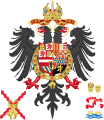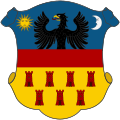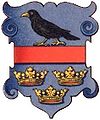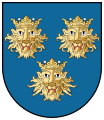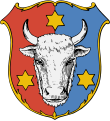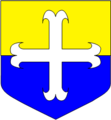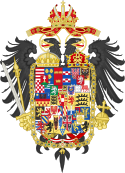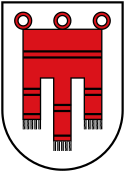Herb Austro-Węgier
Herb Austro-Węgier w dużej wersji składa się z dwóch jednakowych wielkości tarcz herbowych:
- po prawej herbowej duży herb Cesarstwa Austrii
- po lewej herbowej duży herb Królestwa Węgier
Pomiędzy nimi znajduje się herb rodowy Domu Habsbursko-Lotaryńskiego, czyli trójdzielna tarcza herbowa, na której widnieją po herbowej prawej lew czerwony z błękitną koroną i takimi pazurami na złotym (Habsburg); na środkowym na czerwonym srebrny pas (Austria); po lewej herbowej na złotym pas skośny czerwony, na którym trzy srebrne orły (Lotaryngia). Herb rodowy otoczony jest Orderem Złotego Runa. Poniżej znajdują się inne ordery Austro-Węgier – m.in. Order Marii Teresy oraz Order Świętego Stefana.
U podstawy herbu widnieje szarfa z łacińskim napisem „Indivisibiliter ac Inseparabiliter” – „Niepodzielna i Nierozdzielna” – będącym ostatnią dewizą Austro-Węgier (a właściwie dewizą cesarza Karola I).
Widoczny herb duży używany był w latach 1915–1918. Wprowadzony został Obwieszczeniem c.k. Prezydenta Ministrów z dnia 3 listopada 1915 r. w sprawie herbu, przeznaczonego do używania we wspólnych instytucyach austryacko-węgierskiej Monarchii[1]. Mały wspólny herb został zmieniony Obwieszczeniem c. k. Prezydenta Ministrów z dnia 27 kwietnia 1916 r. w sprawie ustanowienia nowej formy małego wspólnego herbu, przeznaczonego dla instytucyi Monarchii austryacko-węgierskiej[2].
Herb mały z 1916 po prawej herbowej miał mały herb Austrii – dwugłowego orła z tarczą w kolorach arcyksięstwa Austrii (dawne barwy Babenbergów i późniejsze Republiki), po lewej mały herb Węgier – do symboli węgierskich dodano chorwacką szachownicę. Pośrodku – trójdzielna tarcza herbowa Habsburgów. W herbie małym nie występują herby poszczególnych królestw i krajów koronnych (z wyjątkiem wspomnianej Chorwacji), nie ma też orderów.
W poprzednim okresie herb Austrii i Węgier najczęściej występowały osobno. Wspólnie pojawiały się na nielicznych dokumentach, szczególnie często od 1915.
Protoplaści Herbu Austro-Węgier
Cesarstwo
Królestwo Węgier
Wielki herb z 1850
- (c) Odejea, CC BY-SA 3.0
2 Herb Jerozolimy
Wielki herb z 1867
VIII Herb Śląska
Wielki herb z 1915
Cesarstwo Austrii
IV Herb Śląska
Królestwo Węgier
Przypisy
Zobacz też
- Flaga Austro-Węgier
- Herb Imperium Rosyjskiego
- Herb Rosji
- Godło Świętego Cesarstwa Rzymskiego
- Godło Związku Niemieckiego
- Herb Prus
- Godło Drugiej Rzeszy
- Herb Republiki Weimarskiej
- Godło III Rzeszy
- Herb Niemiec
- Godło Austrii
Media użyte na tej stronie
Autor: Tom Lemmens (in collaboration with Heralder), Licencja: CC BY-SA 3.0
Greater Coat of Arms of Joseph II, Holy Roman Emperor
Autor: Sodacan, Licencja: CC BY-SA 3.0
Imperial Coat of Arms of the Empire of Austria-Hungary, used from 1866 to 1915.
Autor: Tom Lemmens (in collaboration with Heralder), Licencja: CC BY-SA 3.0
Middle Coat of Arms of Leopold II and Francis II, Holy Roman Emperors
Shield of coat of arms of Upper Austria
Autor: Heralder, elements by Sodacan, Licencja: CC BY-SA 3.0
Middle Coat of arms of Charles V, Holy Roman Emperor (Charles I as King of Spain) (1530-1556)
The coat of arms cropped out of File:Wappen_Ungarische_Länder_1915_(Mittel).png. The image is also slightly edited to restore alignment. Intended for the w:Blazon article as the rest of the image is irrelevant. The original description follows.
Coat of Arms of Babenbergian Marcha orientalis called Old Austria, with five golden eagles on black, today coat of arms of Austrian Federal State of Lower Austria. Given in the Babenberg Family Tree around 1490, attributed to Adalbert, Margrave of Austria (~985 – 1055) – If he did bear this coat of arms is unbeknown.
Autor: Heralder, Licencja: CC BY-SA 3.0
Middle Coat of Arms of Charles VI, Holy Roman Emperor
Autor: Madboy74, Licencja: CC0
The coat of arms of Dalmatia
Autor: Лобачев Владимир, Licencja: CC BY-SA 4.0
Coats of arms of Bukovina taken from Ion Nistor's Harta Etnografică a Bucovinei. The field colors are inverted.
Autor: Tom Lemmens (in collaboration with Heralder), Licencja: CC BY-SA 3.0
Greater Coat of Arms of Leopold II and Francis II, Holy Roman Emperors
Autor: OSeveno, accrediting for elements created by:
User:Shadowxfox (eagle),
User:Etxeko (tower),
User:Madboy74 (sun, moon), Licencja: CC BY-SA 4.0
Coat of arms of Transylvania
Shield of the coats of the Habsburg-Lorraine family. Right side (in heraldic terms) the coat of arms of Habsburg, in the middle the right-white-red coat of arms of Austria, on the left (in heraldic terms) the coat of arms of Lorraine.
Autor: Heralder, Licencja: CC BY-SA 3.0
Arms of the Archduchy of Austria
Współczesna wersja herbu Czeskiego Śląska.
Autor: Heralder, Licencja: CC BY-SA 3.0
Middle Coat of Arms of Rudolf II, Matthias and Ferdinand II, Holy Roman Emperors
Autor: Rs-nourse, Licencja: CC BY-SA 3.0
Coat of arms of Maximilian I, King of the Romans
Autor: Tom Lemmens (in collaboration with Heralder), Licencja: CC BY-SA 3.0
Middle Coat of Arms of Joseph II, Holy Roman Emperor
Shield of the Austrian Countries, designed in 1915 for the Middle Coat of Arms of the Austrian Countries and the Middle Common Coat of Arms of Austria-Hungary.
Autor: Samhanin, Licencja: CC0
Coat of arms of Imperial Free City of Trieste (1850-1918)
The coat of arms of of Hungary (1919-1938)
Coat of Arms of Istria County
Autor: MicheletB, Licencja: CC-BY-SA-3.0
Une croix ancrée d’argent sur champ coupé d’or et d’azur, qui est de la principauté de Gradisca
Autor: Heralder, some elements from File:CoA Maximilian I of Habsburg.svg, lions by Sodacan, Licencja: CC BY-SA 3.0
Middle Coat of Arms of Ferdinand I and Maximilian II, Holy Roman Emperors
Autor: Heralder, Licencja: CC BY-SA 3.0
Coat of Arms of Ferdinand III, Holy Roman Emperor
Autor: Nanin7, Licencja: CC BY-SA 3.0
Herb Królestwa Ilirii bez żadnych dodatków
Autor: User:Thommy9, Licencja: CC0
The coat of arms of Hungary (escutcheon only).
Numbers of the shield quarters of the Middle Coat of Arms_of_the_Austrian_Countries_(1915)
numbered points of a shield of a coat of arms.
Historický znak Moravy.
Autor: Ailura, Licencja: CC BY-SA 3.0 at
Majolikasammlung Bad Radkersburg
Coat of arms of the Austro-Hungarian province of Bosnia as described in a 1889 decree.
Autor: Heralder, elements Sodacan, Licencja: CC BY-SA 3.0
Middle Coat of Arms of Leopold I, Holy Roman Emperor
Flag
Autor: Buho07, Licencja: CC BY-SA 3.0
Coat of arms of Austria-Hungary with numbers 1867-1915
Autor: Rs-nourse, Licencja: CC BY-SA 3.0
Frederick III, Holy Roman Emperor (not installed)
Coat of arms of the City of Fiume as part of the Kingdom of Hungary
Coat of arms of Slavonia (Croatia) as used during the Habsburg Monarchy.
Autor: Heralder & Tom Lemmens, Licencja: CC BY-SA 3.0
Greater Coat of Arms of Charles VI, Holy Roman Emperors
Autor: Felipe Fidelis Tobias, Licencja: CC BY-SA 4.0
Lesser Coat of arms of the Austria-Hungary (1916-1918)
Historic coat of arms of (central) Croatia. Symbol of Croats.
Wappen von Galizien
Vincenzo Coronelli - Repubblica di Venezia p. IV. Citta, Fortezze, ed altri Luoghi principali dell' Albania, Epiro e Livadia, e particolarmente i posseduti da Veneti descritti e delineati dal p. Coronelli, Venice, 1688.
Autor: Madboy74, Licencja: CC0
The coat of arms of Lodomeria
Numbers of the shield quarters of Arms_of_the_Hungarian_Lands_1915
Autor: Tom Lemmens & Heralder, elements Sodacan, Licencja: CC BY-SA 3.0
Coat of Arms of Francis I, Holy Roman Emperor
K. k. Kreisregierung für Vorarlberg mit kaiserlichem Wappen, Gemälde auf Holz, um 1850
Bregenz, Vorarlberg Museum
| Vorarlberg museum
|
|||
|---|---|---|---|
 |
|||
| Oficjalna nazwa | vorarlberg museum | ||
| Miejsce | Bregencja, Vorarlberg, Austria | ||
| Współrzędne | 47° 30′ 15,84″ N, 9° 44′ 48,01″ E | ||
| Data powstania | 1857 | ||
| Strona internetowa | Vorarlberg Museum website | ||
| Kontrola autorytatywna | |||
Wappen von Galizien




